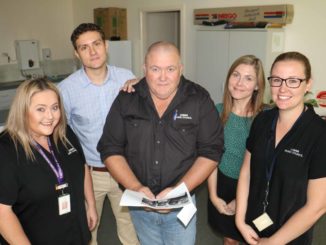
Cobar Shire Council’s three newest councillors, Janine Lea-Barrett, Julie Payne and Chris Lehmann, have now served one year “on the job” and all agree the past year has been a real learning curve.
“My first year has been exciting, frustrating, exhilarating and an education, sometimes all in the one meeting!” Cr Lea-Barrett said.
Cr Lea-Barrett said she has however very much relished the opportunity to assist in the guidance of the Local Government in Cobar.
Cr Payne has found her first year as a councillor to be “mostly enjoyable” and also “frustrating” and she said the role was more than she had anticipated.
“My idea was to assist residents with any concerns they may have and take it to council for resolution.
“I find major decision making, which is new to me, quite overwhelming at times,” Cr Payne admitted.
“I still have a problem understanding Clause 30 Voting around meeting procedures concerning motions, divisions etc.”
Cr Payne said she has been grateful for the help and guidance from council’s general manager Peter Vlatko, as well as council’s directors and executive assistant, Janette Booth.
Cr Lea-Barrett and Cr Lehmann also both praised Mr Vlatko and his staff for their help in settling into their roles.
Before running for council, Cr Lea-Barrett attended council meetings as a member of the gallery for a period leading up the election.
“Therefore I understood, as much as any outsider can understand, the procedures and processes.
“Being on the inside has certainly enforced those procedures and processes,” she said.
Cr Lehman said he thought the role of a councillor would have been more in depth and that he would have been more involved in decision making.
“We are so restricted by State Government funding that you can’t just go and do something that you want to do,” Cr Lehman said.
“Because there is no funding, and there is no money there, that is the situation, you just have to sit on your hands and wait.
“There’s so many great community projects in the works at the moment but we have to just sit on our hands until they fund it,” he said.
Cr Lea-Barrett agreed saying restrictions on what council can do or not do has been an eye opener for her.
“The ability of Local Government is limited, State and Federal Government have far more say with a big picture approach.
“I don’t think this is necessarily bad as long as the Local Government is heard and strategic plans are put into play,” Cr Lea-Barrett said.
All three said they had underestimated the time they would need to dedicate to the role.
“I was not aware of how much time is spent each month attending meetings, workshops, committees, inspections and training,” Cr Payne said.
“This varies of course on how well informed you want to be.”
Cr Lea-Barrett said she estimates that she would spend five to 10 hours per week on council matters, depending on the subject she is researching.
Cr Lehmann said there is a lot of reading involved in the role with some meeting agendas being 200, 400 or sometimes 600 pages long.
Cr Payne told The Cobar Weekly she has very much enjoyed attending youth council meetings as part of her role.
“I quite impressed by the committee members,” she said.
“It would be great if more young people from Cobar would join the youth council and bring some new ideas to the table.”
Cr Lea-Barrett has taken on roles with a number of council committees including the economic taskforce as chair, Rural Roads Advisory Committee, Western Division Councils, Murray Darling Association and the Health Services Working Group.
Cr Lehmann said while he is council’s representative on the Tourism Advisory Committee and also the Murray Darling Basin Authority, neither group he is disappointed that neither committee has had a meeting since his nomination.
Cr Payne and Cr Lea-Barrett said they believed council had made some good progress this past year.
Cr Payne said she had been pleased to have been involved in the process of negotiating the new water treatment plant.
Cr Lea-Barrett said she was happy to also have been involved in getting the new water treatment plant to the construction stage; to have been part of the review of the water distribution network; to have been able to support the Cobar Primary Health Care Centre’s application for funding for extensions; and to open the discussion on the economic direction of the area.

